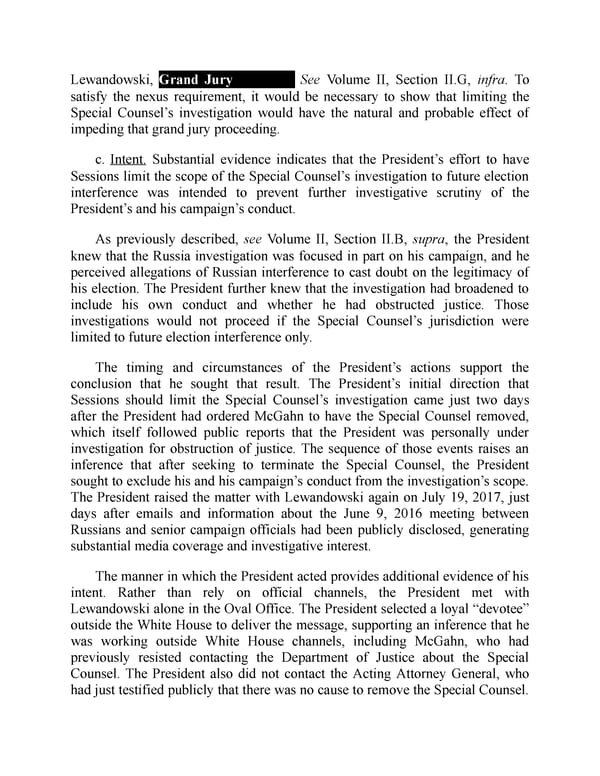Lewandowski, Grand Jury█ █ ███ See Volume II, Section II.G, infra. To satisfy the nexus requirement, it would be necessary to show that limiting the Special Counsel’s investigation would have the natural and probable effect of impeding that grand jury proceeding. c. Intent. Substantial evidence indicates that the President’s effort to have Sessions limit the scope of the Special Counsel’s investigation to future election interference was intended to prevent further investigative scrutiny of the President’s and his campaign’s conduct. As previously described, see Volume II, Section II.B, supra, the President knew that the Russia investigation was focused in part on his campaign, and he perceived allegations of Russian interference to cast doubt on the legitimacy of his election. The President further knew that the investigation had broadened to include his own conduct and whether he had obstructed justice. Those investigations would not proceed if the Special Counsel’s jurisdiction were limited to future election interference only. The timing and circumstances of the President’s actions support the conclusion that he sought that result. The President’s initial direction that Sessions should limit the Special Counsel’s investigation came just two days after the President had ordered McGahn to have the Special Counsel removed, which itself followed public reports that the President was personally under investigation for obstruction of justice. The sequence of those events raises an inference that after seeking to terminate the Special Counsel, the President sought to exclude his and his campaign’s conduct from the investigation’s scope. The President raised the matter with Lewandowski again on July 19, 2017, just days after emails and information about the June 9, 2016 meeting between Russians and senior campaign officials had been publicly disclosed, generating substantial media coverage and investigative interest. The manner in which the President acted provides additional evidence of his intent. Rather than rely on official channels, the President met with Lewandowski alone in the Oval Office. The President selected a loyal “devotee” outside the White House to deliver the message, supporting an inference that he was working outside White House channels, including McGahn, who had previously resisted contacting the Department of Justice about the Special Counsel. The President also did not contact the Acting Attorney General, who had just testified publicly that there was no cause to remove the Special Counsel.
 Mueller Report PDF Page 363 Page 365
Mueller Report PDF Page 363 Page 365